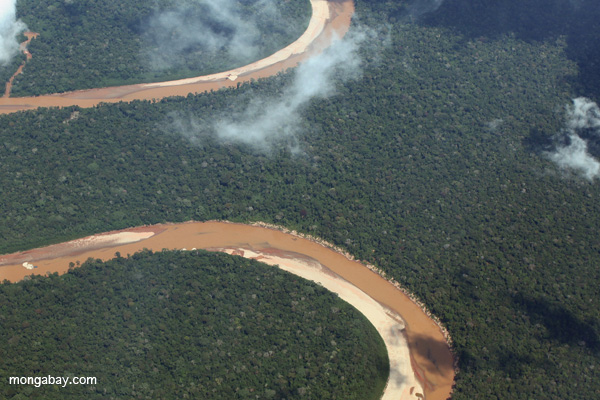Peruvian authorities struggle to restore records lost during government transition

Gold mining in the Peruvian Amazon. Photos by Rhett A. Butler
Non-profit organizations are working with the regional government of Loreto, in northeastern Peru, to replace documents and data reportedly lost or destroyed before newly-elected officials took office.
Some hard disks had been removed from computers. Others had been deleted, password protected, or infected with viruses, according to regional government officials who took office at the beginning of the year.
The lack of data, combined with massive personnel turnover in some offices, will set some projects back as new staff members get up to speed, said Asunta Santillán, who heads the office of the environmental non-profit DAR (Derecho, Ambiente y Recursos Naturales) in Iquitos, the capital of Loreto.
“We’ll have to go back to square one in some processes and start over,” she said. “We’ll have to go backward before we can go forward again.”
Santillán said her office learned of the missing information when DAR staff went to the regional government office complex to discuss projects under way during the last administration.
Several told her they did not have the documents–such as assessment reports and minutes of meetings–related to projects in which DAR was collaborating with the regional offices that handle natural resources, regional protected areas, and forestry.
Santillán expects those projects, which include evaluating regional environmental impact statements and streamlining systems for organizing information, to suffer setbacks because of the missing information and the new staff’s lack of familiarity with issues. The new government may also have different priorities, she said.

River carrying silt from an upstream gold mine in Madre de Dios, Peru. Photo by Rhett A. Butler.
Several new officials told of a rocky transition process back in December.
Biologist Jesús Santander, the new head of the Program for Conservation, Management and Sustainable Use of the Biological Diversity of Loreto (PROCREL, for its Spanish initials) said he saw people carry computers over the wall that surrounds the regional government office complex. Some of those computers were reportedly returned without hard disks, he said.
Santander said his office has been less affected than others, though he has been unable to find some recent annual reports, and password protection has made it impossible for staff to use some of the PROCREL computers. Some equipment appears to be missing, as well, he added.
When people arrive at the regional forestry office to ask about permit applications or other administrative matters, director Gustavo Torres said he has to ask them to provide copies of paperwork. He has found printed copies of some case files, but the disk on his computer was wiped clean, he said.
Besides recovering information, one of Torres’ priorities is staff training. Most of his staff is new and inexperienced, he said; for many, this government job is their first.
That inexperience worries Ana Rosa Saenz, director of the Institute of the Common (Instituto del Bien Común, IBC) office in Iquitos, as much as the loss of information.
The IBC has worked with indigenous communities and regional government officials to develop management plans for resources on the communities’ lands. Some of those processes have taken years.
“We’re going to have to invest the time again. There was already good coordination,” especially with certain government offices, Saenz said. “Now we’re back to square one.”

Clearing for cattle pasture in the Peruvian Amazon. Photo by Rhett A. Butler.
Peru has officially been decentralizing government administration since 2002, when then-President Alejandro Toledo signed a law laying the groundwork for distributing responsibilities and budget funds to the country’s 25 regions.
But the process has been rocky. A 2014 report by the national government Controller’s Office noted that regional governments did not always have the expertise and budget funds to carry out their new responsibilities efficiently and effectively.
Various regional governments have also been plagued by corruption accusations. Before the sub-national elections in October 2014, eight regional presidents faced charges for alleged misfeasance or corruption, including Yván Vásquez, who ran for re-election in Loreto but was defeated by the new president in the region, Fernando Meléndez.
Those problems are complicated by the lack of a career civil service, which makes it easy for politician to reward supporters with government jobs, Saenz said.
“We believe in decentralization,” she said. “But it has to be done well.”
}}